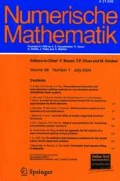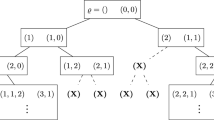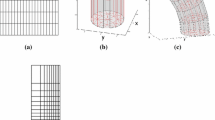Abstract
In this paper we analyze the numerical approximation of diffusion problems over polyhedral domains in \(\mathbb {R}^d\) (\(d = 1, 2,3\)), with diffusion coefficient \(a({\varvec{x}},\omega )\) given as a lognormal random field, i.e., \(a({\varvec{x}},\omega ) = \exp (Z({\varvec{x}},\omega ))\) where \({\varvec{x}}\) is the spatial variable and \(Z({\varvec{x}}, \cdot )\) is a Gaussian random field. The analysis presents particular challenges since the corresponding bilinear form is not uniformly bounded away from \(0\) or \(\infty \) over all possible realizations of \(a\). Focusing on the problem of computing the expected value of linear functionals of the solution of the diffusion problem, we give a rigorous error analysis for methods constructed from (1) standard continuous and piecewise linear finite element approximation in physical space; (2) truncated Karhunen–Loève expansion for computing realizations of \(a\) (leading to a possibly high-dimensional parametrized deterministic diffusion problem); and (3) lattice-based quasi-Monte Carlo (QMC) quadrature rules for computing integrals over parameter space which define the expected values. The paper contains novel error analysis which accounts for the effect of all three types of approximation. The QMC analysis is based on a recent result on randomly shifted lattice rules for high-dimensional integrals over the unbounded domain of Euclidean space, which shows that (under suitable conditions) the quadrature error decays with \(\mathcal {O}(n^{-1+\delta })\) with respect to the number of quadrature points \(n\), where \(\delta >0\) is arbitrarily small and where the implied constant in the asymptotic error bound is independent of the dimension of the domain of integration.


Similar content being viewed by others
Notes
The assumption on \(a\) made in [5, 36] can be weakened in the boundary case \(t=1\) from \(a(\cdot ,\omega ) \in {\varvec{C}}^{1}(\overline{D})\) to \(a(\cdot ,\omega ) \in {\varvec{C}}^{0,1}(\overline{D})\), since this implies \(\nabla a(\cdot ,\omega ) \in L^{\infty }(D)\) and then the crucial Lemma A.2 in [5] can be replaced by the simple inequality \(\Vert bv\Vert _{H^1(D)} \le C (\Vert \nabla b\Vert _{L^{\infty }(D)} \Vert v\Vert _{L^2(D)} + \Vert b\Vert _{L^{\infty }(D)} \Vert v\Vert _{H^1(D)})\), for all \(b \in {\varvec{C}}^{0,1}(\overline{D})\) and \(v \in H^1(D)\).
References
Adler, R.J.: The Geometry of Random Fields. Wiley, London (1981)
Bogachev, V.I.: Gaussian Measures, AMS Monographs, vol. 62. American Mathematical Society, RI (1998)
Charrier, J.: Strong and weak error estimates for elliptic partial differential equations with random coefficients. SIAM J. Numer. Anal. 50, 216–246 (2012)
Charrier, J., Debussche, A.: Weak truncation error estimates for elliptic PDEs with lognormal coefficients. Stoch. PDEs: Anal. Comput. 1, 63–93 (2013)
Charrier, J., Scheichl, R., Teckentrup, A.L.: Finite element error analysis of elliptic PDEs with random coefficients and its application to multilevel Monte Carlo methods. SIAM J. Numer. Anal. 51, 322–352 (2013)
Cools, R., Kuo, F.Y., Nuyens, D.: Constructing embedded lattice rules for multivariate integration. SIAM J. Sci. Comput. 28, 2162–2188 (2006)
Da Prato, G., Zabczyk, J.: Stochastic Equations in Infinite Dimensions, Vol. 44 of Encyclopedia of Mathematics and its Applications. Cambridge University Press, Cambridge (1992)
Dick, J.: On the convergence rate of the component-by-component construction of good lattice rules. J. Complexity 20, 493–522 (2004)
Dick, J., Kuo, F.Y., Sloan, I.H.: High dimensional integration—the quasi-Monte Carlo way. Acta Numer. 22, 133–288 (2013)
Dick, J., Pillichshammer, F.: Digital Nets and Sequences. Discrepancy Theory and Quasi-Monte Carlo Integration. Cambridge University Press, Cambridge (2010)
Dick, J., Pillichshammer, F., Waterhouse, B.J.: The construction of good extensible rank-1 lattices. Math. Comp. 77, 2345–2374 (2008)
Frauenfelder, P., Schwab, Ch., Todor, R.A.: Finite elements for elliptic problems with stochastic coefficients. Compu. Methods Appl. Mech. Eng. 194, 205–228 (2005)
Ghanem, R.G., Spanos, P.D.: Stochastic Finite Elements. Dover, New York (1991)
Gittelson, C.J.: Stochastic Galerkin discretization of the isotropic lognormal diffusion problem. Math. Models Methods Appl. Sci. 20, 237–263 (2010)
Graham, I.G., Kuo, F.Y., Nuyens, D., Scheichl, R., Sloan, I.H.: Quasi-Monte Carlo methods for elliptic PDEs with random coefficients and applications. J. Comput. Phys. 230, 3668–3694 (2011)
Hickernell, F.J., Sloan, I.H., Wasilkowski, G.W.: On tractability of weighted integration for certain Banach spaces of functions. In: Niederreiter, H. (ed.) Monte Carlo and Quasi-Monte Carlo Methods 2002, pp. 51–71. Springer-Verlag, Berlin (2004)
Hoang, V.-H., Schwab, Ch.: \(N\)-term Wiener chaos approximation rates for elliptic PDEs with lognormal Gaussian random inputs. Math. Models Methods Appl. Sci. 24, 797–826 (2014)
Kuo, F.Y.: Component-by-component constructions achieve the optimal rate of convergence. J. Complexity 19, 301–320 (2003)
Kuo, F.Y., Schwab, Ch., Sloan, I.H.: Quasi-Monte Carlo finite element methods for a class of elliptic partial differential equations with random coefficient. SIAM J. Numer. Anal. 50, 3351–3374 (2012)
Kuo, F.Y., Schwab, Ch., Sloan, I.H.: Quasi-Monte Carlo methods for very high dimensional integration: the standard weighted-space setting and beyond. ANZIAM J. 53, 1–37 (2011)
Kuo, F.Y., Sloan, I.H., Wasilkowski, G.W., Waterhouse, B.J.: Randomly shifted lattice rules with the optimal rate of convergence for unbounded integrands. J. Complexity 26, 135–160 (2010)
Kuo, F.Y., Wasilkowski, G.W., Waterhouse, B.J.: Randomly shifted lattice rules for unbounded integrals. J. Complexity 22, 630–651 (2006)
Lord, G.J., Powell, C.E., Shardlow, T.: An Introduction to Computational Stochastic PDEs. Cambridge University Press, Cambridge (2014)
McLean, W.: Strongly Elliptic Systems and Boundary Integral Equations. Cambridge University Press, Cambridge (2000)
Naff, R.L., Haley, D.F., Sudicky, E.A.: High-resolution Monte Carlo simulation of flow and conservative transport in heterogeneous porous media 1. Methodology and flow results. Water Resour. Res. 34, 663–677 (1998)
Naff, R.L., Haley, D.F., Sudicky, E.A.: High-resolution Monte Carlo simulation of flow and conservative transport in heterogeneous porous media 2. Transport Results. Water Resour. Res. 34, 679–697 (1998)
Nichols, J.A.: Quasi-Monte Carlo methods with applications to partial differential equations with random coefficients. Ph.D. Thesis, University of New South Wales (2014)
Nichols, J.A., Kuo, F.Y.: Fast CBC construction of randomly shifted lattice rules achieving \({{\cal O}}(N^{-1+\delta })\) convergence for unbounded integrands in \({{\mathbb{R}}}^s\) in weighted spaces with POD weights. J. Complexity 30, 444–468 (2014)
Nuyens, D., Cools, R.: Fast algorithms for component-by-component construction of rank-\(1\) lattice rules in shift-invariant reproducing kernel Hilbert spaces. Math. Comp. 75, 903–920 (2006)
Nuyens, D., Cools, R.: Fast component-by-component construction of rank-\(1\) lattice rules with a non-prime number of points. J. Complexity 22, 4–28 (2006)
Schwab, Ch., Gittelson, C.J.: Sparse tensor discretizations of high dimensional and stochastic PDEs. Acta Numer. 20, 291–467 (2011)
Schwab, Ch., Todor, R.A.: Karhunen–Loève approximation of random fields by generalized fast multipole methods. J. Comput. Phys. 217, 100–122 (2006)
Sloan, I.H., Kuo, F.Y., Joe, S.: Constructing randomly shifted lattice rules in weighted Sobolev spaces. SIAM J. Numer. Anal. 40, 1650–1665 (2002)
Sloan, I.H., Woźniakowski, H.: When are quasi-Monte Carlo algorithms efficient for high-dimensional integrals? J. Complexity 14, 1–33 (1998), 125, 569–600 (2013)
Sloan, I.H., Wang, X., Woźniakowski, H.: Finite-order weights imply tractability of multivariate integration. J. Complexity 20, 46–74 (2004)
Teckentrup, A.L., Scheichl, R., Giles, M.B., Ullmann, E.: Further analysis of multilevel Monte Carlo methods for elliptic PDEs with random coefficients. Numer. Math. 125, 569–600 (2013)
Wasilkowski, G.W., Woźniakowski, H.: Complexity of weighted approximation over \(\mathbb{R}^1\). J. Approx. Theory. 103, 223–251 (2000)
Wasilkowski, G.W., Woźniakowski, H.: Tractability of approximation and integration for weighted tensor product problems over unbounded domains. In: Fang, K.-T., Hickernell, F.J., Niederreiter, H. (eds.) Monte Carlo and Quasi-Monte Carlo Methods 2000, pp. 497–522. Springer, Berlin (2002)
Widom, H.: Asymptotic behaviour of the eigenvalues of certain integral operators. Trans. Am. Math. Soc. 109, 278–295 (1963)
Acknowledgments
The authors would like to thank Tony Shardlow and Helmut Harbrecht for fruitful discussions that lead to Corollary 5 and Proposition 9. We would also like to acknowledge the financial support of the Australian Research Council, of the UK Engineering and Physical Sciences Research Council and of the European Research Council under grant ERC AdG247277.
Author information
Authors and Affiliations
Corresponding author
Rights and permissions
About this article
Cite this article
Graham, I.G., Kuo, F.Y., Nichols, J.A. et al. Quasi-Monte Carlo finite element methods for elliptic PDEs with lognormal random coefficients. Numer. Math. 131, 329–368 (2015). https://doi.org/10.1007/s00211-014-0689-y
Received:
Revised:
Published:
Issue Date:
DOI: https://doi.org/10.1007/s00211-014-0689-y




